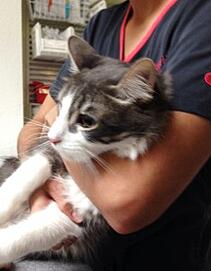Anesthesia is routine in practice. However, it is important not to become complacent. All patients tolerate and react to anesthesia differently, and monitoring every patient closely is extremely critical.


 This is Spunky. He is a 6-month old stray kitten that was brought in for a neuter and first FVRCP vaccination. He did well under anesthesia during his neuter and upon recovering was given his vaccine. A few minutes after receiving his vaccination, he acutely stopped breathing. Luckily the technician who was closely monitoring him was astute enough to recognize something was wrong. The doctor in charge immediately began chest compressions and ventilations as his heart had stopped and he was in cardiac arrest. Please take a moment to review CPCR technique. Review on CPCR Technique
This is Spunky. He is a 6-month old stray kitten that was brought in for a neuter and first FVRCP vaccination. He did well under anesthesia during his neuter and upon recovering was given his vaccine. A few minutes after receiving his vaccination, he acutely stopped breathing. Luckily the technician who was closely monitoring him was astute enough to recognize something was wrong. The doctor in charge immediately began chest compressions and ventilations as his heart had stopped and he was in cardiac arrest. Please take a moment to review CPCR technique. Review on CPCR Technique
Cats rarely have vaccination reactions, but when they do, they are typically very severe and anaphylactic in nature. Spunky was given the appropriate medications including atropine, epinephrine, a small bolus of fluids, and was also given Dex SP since a vaccine reaction was suspected as the underlying cause. Luckily, Spunky's heart began beating again and he has made a great recovery. It is very rare for a pet to survive cardiac arrest. The ones that do are typically the young and otherwise healthy patients and appropriate intervention is absolutely critical. Spunky did have cortical vision loss for about 3 weeks after this incident which is caused by temporary oxygen loss to the brain. He has now regained most of his vision, and he is a happy and playful kitten at home.
There are 2 lessons to be learned from this. First, it is best to not give vaccinations while a patient is under anesthesia. Unless the patient is extremely fractious or aggressive, it is best to just administer them on another day, or before they go home once they are completely recovered from anesthesia. Secondly, you can never let your guard down when watching patients under anesthesia- including before (after premedication), during, or after the procedure. Veterinary technicians are vital to helping watch the patients in the hospital and knowing what to do in an emergency situation truly is a matter of life or death!


